
In a Democracy Now! special, we spend the hour with Evo Morales, the first indigenous president of Bolivia. In a wide-ranging conversation, Morales discusses the impact of the war in Iraq on Latin America, warns against the use of biofuels to reduce carbon emissions and highlights the importance of indigenous rights. “I am convinced that the indigenous people are the moral reserve of humanity,” Morales said. He also discusses the enduring legacy of Che Guevara, whether he will stop sending Bolivian troops to train at the School of the Americas and why he is establishing diplomatic relations with Iran. “As far as I know,” Morales said. “[Iran] is not a country that is sending troops to kill people in other countries.” [includes rush transcript]
Transcript
AMY GOODMAN: Today, a Democracy Now! special: We spend the hour with Evo Morales, the first indigenous president of Bolivia. He traveled to New York this week, where he’s scheduled to speak before the United Nations General Assembly today. On Monday, he addressed a high-level U.N. meeting on climate change, during which he accused what he called “predatory capitalism” of affecting the environment.
Evo Morales first spoke before the U.N. General Assembly last year, where he dramatically brandished a coca leaf and vowed never to yield to U.S. pressure to criminalize coca production. Morales’s rise to power began with his leadership of the coca growers union in Bolivia and his high-profile opposition to the U.S.-funded eradication of the coca crop. He helped to lead the street demonstrations by Indian and union groups that toppled the country’s last two presidents.
An Aymara Indian, Evo Morales became the country’s first indigenous president when he was elected nearly two years ago with more popular support than any Bolivian leader in decades. Since then, he has moved to nationalize Bolivia’s oil and gas industry and is seeking a new constitution that would grant more power to Bolivia’s indigenous majority.
Today, we spend the hour with Evo Morales, talking about indigenous rights, biofuels, the Iraq War, establishing diplomatic relations with Iran, and the enduring legacy of Che Guevara on Latin America. Democracy Now!’s Juan González and I sat down with President Morales at the Bolivian mission here in New York. I began by asking President Morales what his message is this year to the U.N. General Assembly.
PRESIDENT EVO MORALES: [translated] Last year was our first experience, my first time at the United Nations, as well as my first time in the United States. And as the coca leaf stands for and is symbolic of the struggle of the peoples for land and for their sovereignty, so last time I was here, it was my responsibility to talk about how it is that I came to become president of Bolivia.
But today, the most important thing is to talk about the changes that we’re forging in democracy through this cultural and democratic revolution in my country and at the same time share my enormous concern and to talk about things that are not just a regional or a local problem, but a global problem, and that’s the environment.
JUAN GONZÁLEZ: One of the things that has happened, changes, obviously, is that just a few days ago, more than a week ago, the United Nations General Assembly passed an important declaration in terms of indigenous rights. Article 34, specifically, says that indigenous peoples have rights to promote, develop and maintain their institutional structures and their customs. How important is this to Bolivia in the current writing of the new constitution that you’re involved in now?
PRESIDENT EVO MORALES: [translated] First of all, we’d like to salute, thank and recognize the countries of the world that approved and voted for this Declaration of the Rights of Indigenous Peoples, just as 50, 60 years ago, the United Nations for the first time recognized the Universal Declaration of Human Rights. And it’s only now, over 500 years later, that indigenous people’s rights are being recognized. Happily, there were only a few countries that didn’t support this declaration.
And so, I want to say to the indigenous peoples, but also to the other peoples who live in the cities, that this is a very important thing that the struggle for indigenous people’s rights has not been in vain. And it was very important to get organized to mobilize. It took over 20 years, but, working together, people were able to do this, to approve this declaration and establish that we are people that have rights just like anyone else on earth.
In some cases, it will be to recognize the rights of minorities in some countries, this declaration. In my country, it’s to make sure that the majority is respected, and it will be respect for their institutions, for their structures. And this is an important contribution to unity within our country, but not because we have a declaration behind us recognized by the United Nations. It’s important that, even though this declaration exists, that doesn’t mean that we, as the majority, are going to be vengeful or use this as the majority.
I want you all to know, through the means of communication like yourself, I want the people of the United States and the people of the world to understand that the indigenous movement is not vengeful. We want to live together, respecting the difference and the diversity that we have. Some of the people in our country, when they saw that this declaration that came out that’s not just a declaration recognizing indigenous peoples, but also right to land, to self-determination, they think that we’re going to take a vengeful attitude, and I’m here to say never.
AMY GOODMAN: What do you think the message was of the four countries that voted no: Canada, New Zealand, Australia and the United States?
PRESIDENT EVO MORALES: [translated] It will be important for not the countries, but the people who lead those countries, their ambassadors, their leaders, to reflect and to embrace a recognition of indigenous people’s rights. I’m convinced that indigenous peoples are the moral reserve of humanity. So amongst indigenous peoples, there’s not a mentality of being individualist, personalist or egotistical, and therefore there’s not an attitude of trying to take over resources and control them for themselves. How nice it would be if those four countries, or better, for the presidents of those four countries, and along with the social forces, and especially the indigenous peoples, join together to save humanity.
JUAN GONZÁLEZ: But in practical terms, implementing this in your country is obviously creating many issues. You have 36 different nationalities among the native people. And the battle now, the constitutional battle over whether you’re going to have provincial autonomy or autonomy for these indigenous nations, how will that work itself out?
PRESIDENT EVO MORALES: [translated] First of all, dialogue and concerting, coming together. You’re right, though, when you recognize that there are some small groups in my country that still don’t recognize exclusion and racism as it exists in our country. And that’s why I call on the countries that not only supported this declaration, but also the countries that didn’t support this declaration, to come together and move forward to recognizing indigenous people’s rights, but without excluding anyone.
My government will guarantee departmental or state-level autonomies, but also local-level autonomies and indigenous people’s autonomies. A lot will depend on the specificities of these different regions. Sometimes there will be regional autonomies and local autonomies; sometimes there will be regional autonomies, as well as indigenous autonomies. And we’ll have to figure out how these different autonomies are going to work together. When we made our initial demands as indigenous, original peoples, there were people who reacted to and rejected our demands. But I want to tell these people now — and some people are originally from a place that dates back to a thousand years, some are much more contemporary, but we all have to learn how to live together.
AMY GOODMAN: Bolivian President Evo Morales. We’ll come back to our conversation in a minute.
[break]
AMY GOODMAN: We return to our conversation with the president of Bolivia, Evo Morales. He’s addressing the United Nations General Assembly today. On Monday, he addressed a high-level U.N. meeting on climate change. Over 80 world leaders attended; President Bush did not. In it, Evo Morales spoke in his speech on Monday about referring to the need to prevent industrialized nations with their gas emissions from continuing harming the planet.
Democracy Now!, Juan González and I sat down with President Morales at the Bolivian mission. Juan asked President Morales about the issue of biofuels.
JUAN GONZÁLEZ: I’d like to ask you about the message that you’re going to be bringing to the United Nations, as well, over the issue of the use of agricultural products for biofuels, that clearly in Brazil President Lula has a different perspective. He is promoting the use of biofuels. What is your perspective on this issue?
PRESIDENT EVO MORALES: [translated] From the time that biofuels were first talked about, we’ve seen a spiraling process of speculation of land. There’s a whole speculation on grains like wheat, not only at the regional level within countries, but also internationally. So, therefore, the cost of agricultural products rises. And this is a product of that moment from which, going forward, people have been talking about biofuels.
And personally, in our movement, as well, we’re convinced that agricultural products should not be dedicated, directed towards automobiles, cars, and that lands be dedicated towards old rusted vehicles. First to people, before automobiles. And that’s our difference.
And we want to debate this, but we don’t want to debate it just as governments or presidents. We want to debate with our peoples, with the social forces in our countries, and I would even dare to say, at the South American regional level, submit this to a referendum of the peoples of South America and let the people say yes or no to different biofuels. This is something I’ve learned from Subcomandante Marcos, from his messages — that is, to govern obeying the people. That means to govern, but respecting the different proposals that social forces put on the table, because sometimes when a proposal is put on the table between presidents, arguments arise, and this can even generate confusion amongst people sometimes. And that’s why I consider it to be very important that people decide with their votes in a referendum about what the future biofuels is going to be. That would be the most democratic thing.
AMY GOODMAN: Mr. President, you’ve just established diplomatic relations with Iran. When the Iranian President Ahmadinejad leaves the United Nations General Assembly, New York, this week, he will first go to Bolivia. Why did you establish diplomatic relations?
PRESIDENT EVO MORALES: [translated] First of all, it’s important our peoples are from the culture of dialogue, so we have diplomatic relations with the United States, we have diplomatic relations with Cuba, just as we have diplomatic relations with France and with Iran, but, above all, diplomatic relations for life, for humanity, for peace with social justice.
In my country, we’re going to be opening commercial and diplomatic relations to establish relationships of complementarity so that we can resolve the social and economic problems that we confront. We’re never going to establish diplomatic relations to wage aggression or to hurt or to declare wars or to get involved in arms races. We’re not of the culture of death.
Moreover, I respect the technology, the industrial development in the area of gas and oil in Iran, and that’s what we’ve seen as interesting, that we can work together on these issues. And I’d like to agree with you. We haven’t ever thought about other issues in our relations. As far as I know, it’s not a country that’s sending troops to end other people’s lives in other countries. And I admire Cuba very much, for example, which sends people to other countries to help save lives.
AMY GOODMAN: Just to follow up on that point, has the United States weighed in? Has the United States responded to your diplomatic relations with Iran? And what do you think of the U.S. talking about perhaps attacking Iran?
PRESIDENT EVO MORALES: [translated] The United States, nor any other country, can observe or comment or have anything to say about the relationships that we have with any other countries. We’re a small country, but we’re a sovereign country with dignity, with the right to establish relations with whoever we want. If the United States government reacts, if they would have reacted, it would suggest that they are still thinking that Latin American countries need to be subordinate to the United States. But happily, in Latin America, there are countries with democracies that are liberating democracies, not subordinate democracies.
AMY GOODMAN: Your vice president has denounced U.S. funding of right-wing think tanks in Bolivia as intervening in internal affairs of your country.
PRESIDENT EVO MORALES: [translated] Former ministers and vice minister of the government of Gonzalo Sánchez de Lozada, who, as you know, escaped to the United States, and the former President Banzer, who, may he rest in peace, as well as former President Tuto Quiroga, these former ministers are financed through foundations, NGOs, to create this counterweight to the government of Evo Morales. It’s impressive. And what we’re asking for is that all international cooperation be transparent, that it come through formally the central government.
AMY GOODMAN: What are those groups pushing for?
PRESIDENT EVO MORALES: [translated] First of all, these neoliberals, the right-wing organizations, the ones who sold out the country, as we say in Bolivia, is to exhaust the image of Evo Morales especially. And so, if they have objected, if they want to exhaust Evo Morales, it’s to be done with the government of Evo Morales. And these things circulated on the Internet, then pamphlets, [inaudible]; verbatim they say, “We have to overthrow this Indian (and leave that blank),” because I can’t repeat those words on the radio.
JUAN GONZÁLEZ: I’d like to ask you about the student protests that broke out recently there and the continuing battle over writing a new constitution. It’s been more than 13 months, and the Constituent Assembly, I understand, now is going to start meeting again. But the battle, especially over this issue of the capital for Bolivia, what is the significance of the battle over whether Sucre or La Paz should be the capital of Bolivia?
PRESIDENT EVO MORALES: [translated] Bolivia was founded in 1825, and the people who were participating, they were only 8 percent of the population; they were all mestizos or criollos. But who fought for the independence from Spain? It was that other 92 percent; it was the indigenous peoples. So we proposed to re-found the country, indigenous peoples, non-indigenous peoples, professional peoples, nonprofessional peoples, but to transform the country. Therefore, there are sectors that are seeking to undermine or make sure that the Constituent Assembly fails.
The enemies of this deep structural transformation that we’re pursuing, some of them have entered, are members of the Constituent Assembly, and they’ve been working from the very beginning, when the Constituent Assembly started on 6th of August, 2006, to undermine the process through the demand for two-thirds, the demand for autonomy, and now the demand to move the capital of the country.
This issue of where the capital is going to be located is not a national issue. It’s not a problem for the government. It’s an issue for just two departments. And there are families that don’t love their country and who are not working for the majorities, who are working for those people who have not been respected, the indigenous majorities, they’re talking about where the capital is going to be located as a tool to shut down the Constituent Assembly.
But what are we working for? What are we betting on? First, as the government and also as the indigenous movement, to make sure that the Constituent Assembly concludes successfully. It’s the best way to find unity, equality and justice, to forge that in my country.
And I would like to remember the words of a businessman, actually, from Bolivia. What did he say before the Constituent Assembly? “I’d rather have rocks in my door than bullets.” What does that mean? That I would rather have these sorts of popular demonstrations and protests happening than a civil war, a fighting war with bullets.
And now, so that we have neither the protests nor the shooting war with bullets, we’re pursuing this deep structural transformation through a democratic process, which is the Constituent Assembly. How are we doing this? Through the creation of writing a new constitution for the country.
Of course, it’s going to be difficult to have equality, but to make those differences between people smaller is possible. Early in the process, only weeks into the process, they said that Evo Morales was not going to respect private property. That was another attack, another attempt to undermine and cause the Constituent Assembly to fail. With the powerful people above, what we’re trying to do is lift up the people, the humble people, from below, through using the strategic natural resources that we have to put them on a more equal footing.
And the other thing that they can’t accept is, how is it that what they call the Indians, that they feel for the country and they’re working for their people and that this Indian is governing well? This is something they can’t tolerate. Two facts: The last time that Bolivia had a budget surplus was in the 1960s during a boom, a tin boom, and we’ve been over 60 years always with a fiscal deficit. Last year, for the first time, in my first year of government, we have a budget surplus, and Bolivia’s international reserves never were more than $1 billion. And this year we’re approaching $5 billion in international reserves. And the modification of the hydrocarbons gas and oil law, which cost us blood, thereafter the nationalization of gas and oil, has allowed Bolivia to improve our revenues, the revenues for the country. An example: In 2005, Bolivia only received $300 million — $300 million in 2005 in revenues from state gas and oil, and this year we’re going to be receiving more than $2 billion in revenues from gas and oil. And this is something they can’t accept.
A political class, for them, government was business. It was enrichment. What they can’t accept is that our corruption in Bolivia has been declining. In the past, Bolivia was considered in the number two position in terms of the championship for the most corrupt country. Many international institutions have recognized that corruption is on the decline in Bolivia. And what these groups don’t accept is that this — what they call an “Indian” can change Bolivia, bring dignity to Bolivia.
And in this situation, some sectors are talking about the re-election of Evo Morales, and so this is something that would have to be become constitutionally permitted. But what do the right, the neoliberal, the opposition, say to this? And they say we can negotiate anything, but not the re-election of this Indian. This is the problem. It’s not a problem of where the capital of the country is located. And, of course, they never liked groups like the ones that you make reference to that will travel from Santa Cruz to Sucre to agitate, to stir up these issues.
AMY GOODMAN: Bolivian President Evo Morales. We’ll return to the conclusion, where he talks about the war in Iraq and the legacy of Che Guevara. Stay with us.
[break]
AMY GOODMAN: We return to our conversation with the Bolivian President Evo Morales. The Bolivian Supreme Court recently asked the government to start extradition proceedings for the former Bolivian President Gonzalo Sánchez de Lozada, who lives here in the United States in Miami. They also asked for an order for him not to be allowed to go to another country, but to be sent back to Bolivia. I asked President Morales what the former president is guilty of and whether he thinks the United States will extradite him.
PRESIDENT EVO MORALES: [translated] First of all, the United States cannot, should not receive, protect delinquents from any part of the world. It is unconscionable that the United States, a democratic country, would be protecting international criminals like Posada Carriles. The process has to do with two issues: first of all, human rights, and second of all, for economic damages done to the state. So people who massacre peoples, that violate human rights and do economic damage to countries and their economies have to go to jail. The United States shouldn’t be sitting there waiting for a process to be put into motion, but rather should kick these people out so that they can be submitted to justice.
I hope the United States respects these norms and respects the decision of our Supreme Court. But here, we have an experience. The last military dictator was sent to jail. And since that time, in Bolivia, no member of the military dares to threaten a coup d’état. Likewise, any democratic government that violates human rights, that massacres people or that does economic damage to the state should also be subject to these sorts of processes, and their leaders should be put in jail, so that they never dare to do it again either.
JUAN GONZÁLEZ: Mr. President, you said a few moments ago that you’d rather have protesters throwing rocks than using guns. In a few weeks, it will be the 40th anniversary of the death of Che Guevara. He died in Bolivia. Looking back at it — you were a child then — what is your sense of the legacy of Che Guevara to the people of Latin America?
PRESIDENT EVO MORALES: [translated] First of all, in the '40s, in the ’50s, in the ’60s — of course, when I hadn't been born yet — my first perception was that people rose up in arms to struggle against the empire. Now, I see quite the opposite, that it’s the empire that’s raising up arms against the peoples. What I think is that back then, that the peoples, they got organized and struggled, looking for justice, for equality. And now I think that these transformations, these structural transformations, are being forged through democracies.
And from these two points of view, Che Guevara continues to be a symbol of someone who gave his life for the peoples, when in Bolivia and in other countries around the world reigned military dictatorships. So that’s why it’s amazing to see that all over the world Che Guevara is still there, 40 years later. But now, we’re living in other times. But to value and recognize that thinking, that struggle, and if we recognize and we value it, that doesn’t mean it means to mechanically follow the steps that he took in terms of military uprising.
And that’s where, for example, I respect Fidel Castro. In 2003, I was invited to a conference in Havana, Cuba. And Fidel said the following: “Don’t do what I’ve done. Do what Chávez is doing: transformations through a constituent assembly.” I think it was a good teaching, because we’ve seen the constituent assemblies in Venezuela, in Ecuador and now in Bolivia, as well, that through democracy we can achieve structural transformations.
AMY GOODMAN: What is the effect of the war on Iraq in Latin America, in Bolivia, in particular?
PRESIDENT EVO MORALES: [translated] There is a feeling that leads to the rejection, the repudiation of the United States government. This intervention of the United States in Iraq helps anti-imperialist thinking and feeling to grow. The pretext of fighting against terrorism and for security, with this pretext, they intervene and create all these deaths. But there are also other issues, economic issues, underlying it. I feel that we’re in a times of not looking to how to extinguish lives, but rather how to save lives.
JUAN GONZÁLEZ: I’d like to ask you about the issue of global warming. It’s become a major increasing discussion in many governments and around the world. From the perspective of the indigenous people of Bolivia, the future of the planet? And what policies must be adopted, especially by the industrialized countries?
PRESIDENT EVO MORALES: [translated] So if globalization does not admit difference and pluralism, if it’s a selective globalization, therefore it will be almost impossible to resolve environmental issues and save humanity. The most important contribution that indigenous peoples can make is to live in harmony with Mother Earth. We say the “Mother Earth,” because the earth gives us life, and neither the Mother Earth nor life can be a commodity. So we’re talking about a profound change in the economic models and systems.
AMY GOODMAN: Several years ago, Father Roy Bourgeois and others who founded the anti-School of the Americas movement at Fort Benning, Georgia, asked that — came and visited you in the palace and asked that Bolivia not send soldiers to train at the — what used to be called the School of the Americas, a place where Banzer, the dictator, had trained. Other countries are considering this ban. I think Venezuela, Argentina, Uruguay, Costa Rica have said they won’t send soldiers. Will Bolivia?
PRESIDENT EVO MORALES: [translated] So, it’s not just a question of not sending people. Perhaps it would be better to shut the School of the Americas. But I understand it’s also part of the survival and continuation of [inaudible] and to create a certain interventionist mindset.
JUAN GONZÁLEZ: I’d like to ask you perhaps a delicate question. You mentioned earlier your admiration for Fidel Castro. Fidel, before he stepped down, had been president for more than forty years, before he stepped down from day-to-day administration in the Cuban government. President Chávez now has been in office for two terms and is seeking to change the law to maintain himself in office. Do you think that the leader of a country, no matter how progressive, should have a limited amount of time in power?
PRESIDENT EVO MORALES: [translated] To put those kinds of limits may not be the most democratic. Here, what’s important is the conscience of a people. And so, our proposal, there has to be a way to revoke leadership roles, but also to ratify leadership, and this is for mayors, for governors, for regional leaders, as well as for presidents. If they have the support of the people, then they have every right to be ratified in power. And mayors, governors and presidents, they can also be revoked, their mandates can be revoked before they finish their terms, if that’s the will of the people. In fact, I’m seeing at this point that, through ratifying and returning people to power, it actually becomes an incentive for them to do a good — and continue to do a good and better job in their municipalities at the departmental levels in the positions that they hold, because the people have valued their work, and that’s why they’re ratified. But when they are not ratified, they take advantage of that fact, and they say, “OK, I’m on my way out the door, so now is the time to steal, as my mandate is ending.”
AMY GOODMAN: What is your assessment of President Bush?
PRESIDENT EVO MORALES: [translated] Why would I have to evaluate President Bush? I respect your country. One concern that I have is that in Iran — in Iraq, the massacre of the people cannot continue. I think that this is something that not only affects President Bush, but affects all the North American people. I think that in this new millennium, we fundamentally should be oriented towards saving lives and not ending lives. The differences continentally between countries, between regions, these should be discussed. And if there’s not agreements between governments and their presidents, why not submit these issues to the peoples to be decided upon? This would be the best way to do democracy now.
AMY GOODMAN: Bolivian President Evo Morales. He speaks today to the U.N. General Assembly.

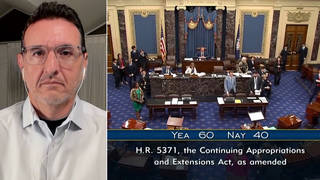
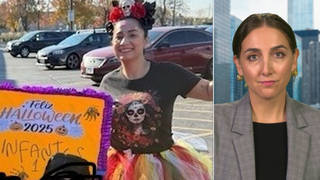
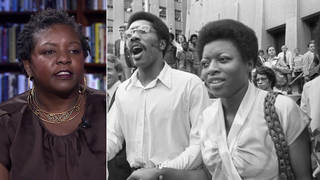
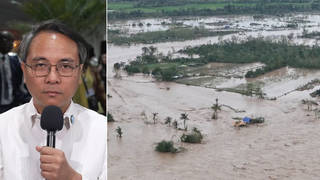





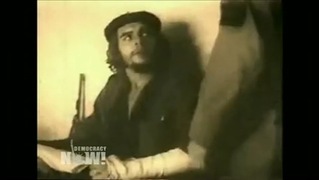
Media Options